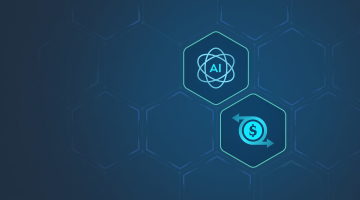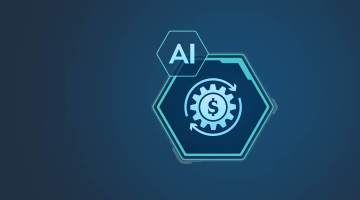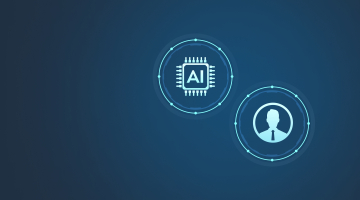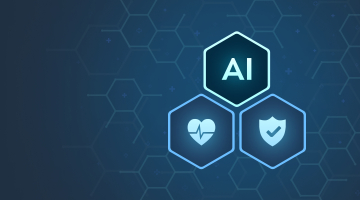

Artificial intelligence in healthcare: Top advantages and use cases
The global pandemic that wreaked havoc across the planet in 2019-2021 (and the World Health Organization proclaimed a complete victory over it only in late spring of 2023) has shown us how fragile population health is and how precarious the survival of the entire civilization looks. It was one of the primary triggers that called for the radical upgrading of national healthcare systems and improving the healthcare industry’s efficiency.
The latest IT achievements are called to become a powerful locomotive that will revolutionize the healthcare sector by pushing the technological envelope across clinical workflows. And what digital technology is universally recognized as the most disruptive contemporary know-how? Of course, artificial intelligence.
This article will uncover the role of AI in healthcare, reveal its most popular types and use cases in the domain, identify benefits, and highlight challenges healthcare organizations face regarding its implementation.
Need to integrate new technology?
Check out our IT consulting services for healthcare.
The role of AI in medical practices
No matter what field AI technology penetrates, it profoundly transforms its mundane approaches and operating mechanisms. The same applies to the medical sphere, where AI systems reshape how healthcare professionals diagnose, treat, and monitor patients. It has brought positive changes to multiple aspects of the medical pipeline and healthcare research – from keeping medical records and processing clinical data to determining accurate diagnoses and improving health outcomes.
By integrating AI-driven solutions in healthcare delivery, medical providers are empowered to make more informed decisions relying on the accurate analysis of patient data. Hospital managers also profit from harnessing this technology since they improve the handling of their administrative tasks, revenue cycle management, and clinical processes.
However, healthcare AI applications are a godsend for not only healthcare providers and medical professionals. This technology can benefit patients as well. It can pave the way for personalized patient care, high-quality health monitoring, improved health outcomes, and promoting health equity.
What types of artificial intelligence can become game-changers for healthcare workers and patient populations?
Related article: A compelling guide for telemedicine app development
AI technologies in healthcare
There are three main AI-powered fields whose capabilities bring maximum value to clinical practice.
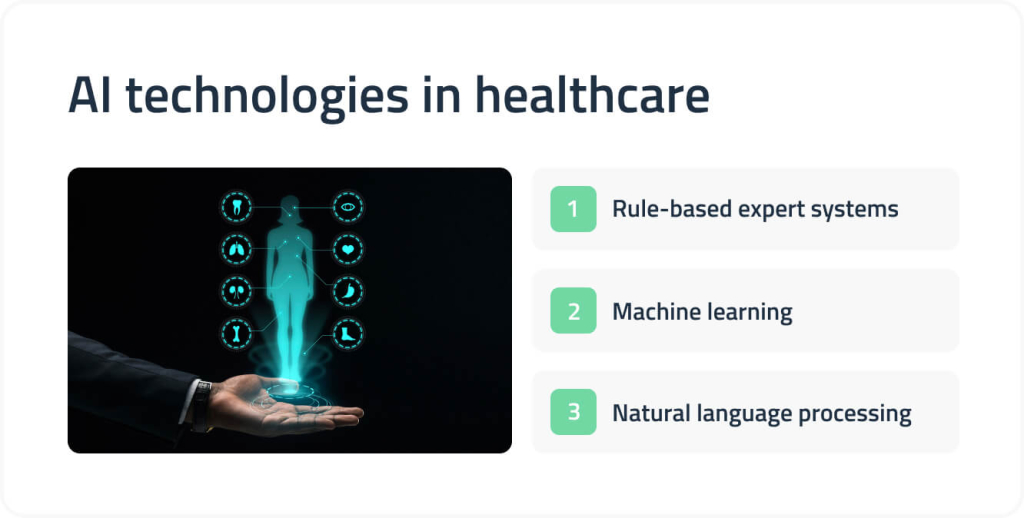
Rule-based expert systems
This is the simplest type of AI tool that appeared as early as the 1980s. Having the traditional “if-then” principle at their core, such systems are widely employed in electronic health records. They operate perfectly with smaller sets of patient and medical data, but once the volume of data and the number of rules expand, the latter come into conflict with each other, rendering the system inadequate for large-scale knowledge management.
Machine learning
ML-powered mechanisms and their advanced version – deep learning algorithms – sift through tons of healthcare data, patient records, and medical images, find patterns in them, and forecast future development with great accuracy. Besides, the technology enables AI to get more sophisticated in its performance and increase the results’ reliability, ushering in precision medicine at its best and guaranteeing better health outcomes for patients.
Natural language processing
This form of artificial intelligence excels at understanding, interpreting, and using human language. As a disruptive healthcare innovation, NLP-driven tools scan health data to extract valuable information from such dossiers and dramatically streamline and facilitate the drug discovery process, treatment applications, diagnosis establishment, and other aspects of healthcare workflow.
Let’s find out how these AI-related technologies are applied in specific healthcare instances.
The use cases of artificial intelligence in the healthcare pipeline
Being vetted professionals in healthcare solution development, we at DICEUS know where AI-fueled software is most effective.
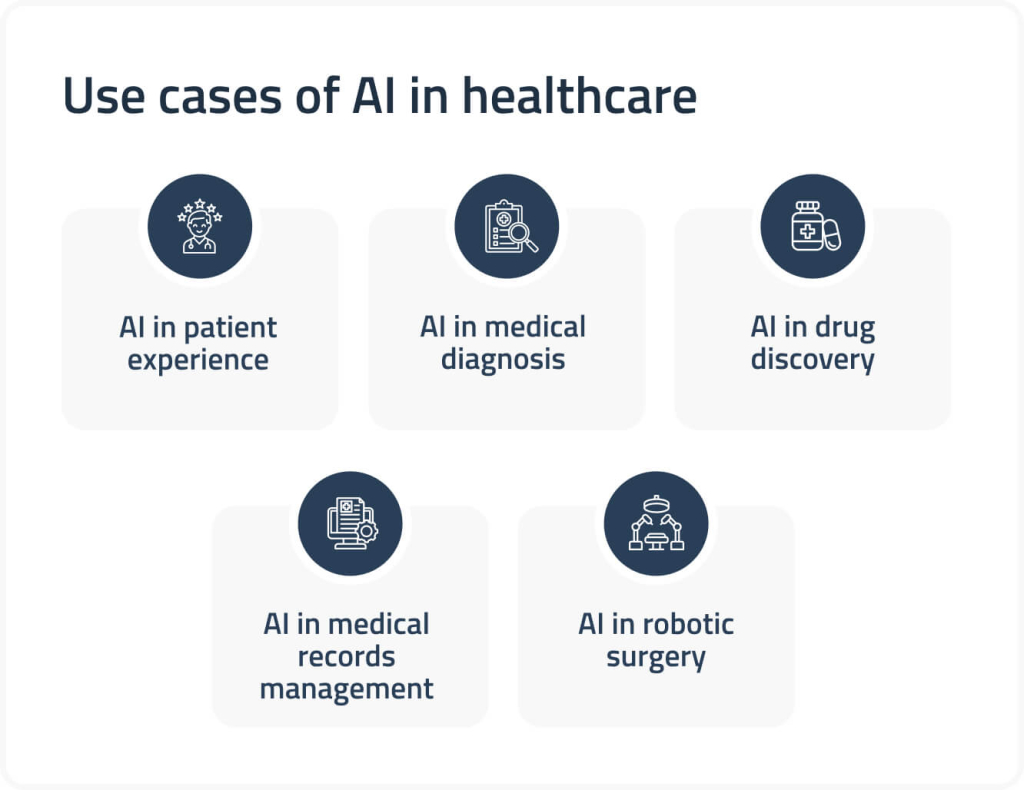
AI in patient experience
Patient safety and satisfaction are the name of the game in the healthcare industry. AI can provide a smooth patient experience even before people cross the threshold of a hospital. High-end speech recognition systems powering healthcare chatbots offer an advanced communication and support channel that issues schedule reminders, plans patient visits, suggests further steps to be taken in the treatment routine, gives tailored recommendations, and more. As a result, hospitals augment the quality of services and obtain improved patient outcomes.
AI in medical diagnosis
Establishing a correct diagnosis requires meticulous analysis of clinical documents and medical imaging, which is a job for human experts. AI algorithms can do it much faster and generate high-accuracy results. Their usage allows healthcare providers to reduce human error and introduce a proactive approach to disease treatment (for instance, enhancing cancer diagnosis or other lethal maladies’ early identification).
AI in drug discovery
Steeply rising research and production costs are the chief obstacles that prevent growth in the field of drug manufacturing. By embracing AI, pharmaceutical companies can cut down on expenditures associated with the drug development process and design new medicines with predicted side effects. Also, AI mechanisms can help identify ideal candidates for conducting clinical trials and tests with newly-created drugs.
AI in medical records management
Today, EHR has become the staple of modern healthcare databases. Yet, searching for required information across billions of data points is still a challenge for hospital personnel to address. That is why a growing number of clinics undertake substantial integration projects, making AI software the key element of their digital infrastructure. It takes such enhanced IT ecosystems a split second to process huge amounts of data and accurately locate the necessary information. As a result, hospitals break down data silos, boost their administrative pipeline, automate repetitive tasks, and maintain budget efficiency.
AI in robotic surgery
Revolutionary transformations across health systems are increasingly introducing robots in their surgery practices, with the niche revenues expected to approach $30 billion by 2030.
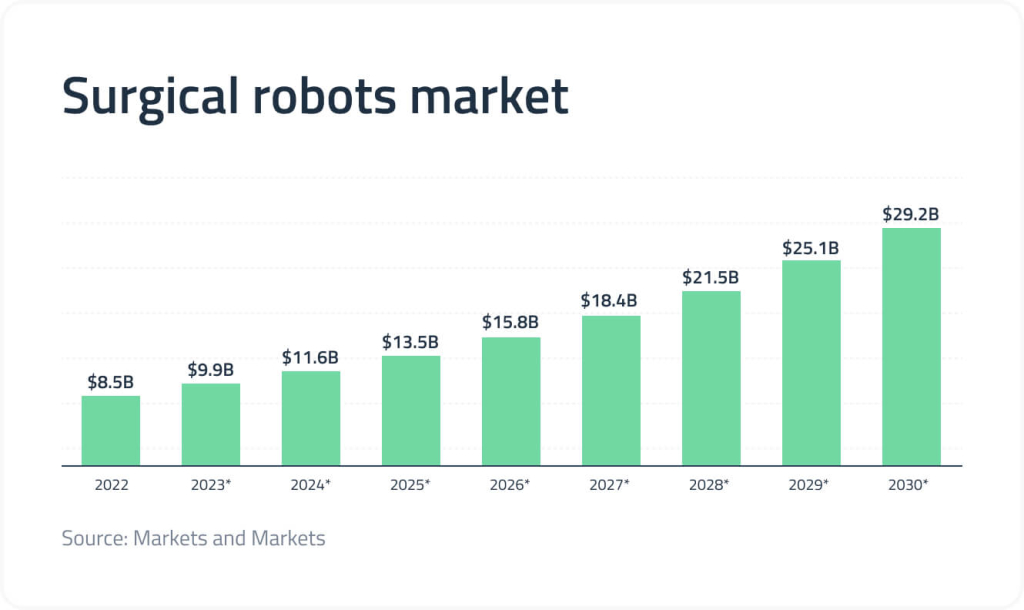
Such robots have proved their efficiency in minimally invasive procedures, lung biopsy, spinal and orthopedic surgery, and more. Enhanced with AI mechanisms, these systems will be able to assist humans in more complex operations, identifying positive surgical margins, lessening pain, cutting down on recovery time, and minimizing complications.
When employed wisely and handled by an adequately trained workforce, AI software can usher in multiple perks both for doctors and patients.
Zooming in on the benefits of AI for healthcare
By integrating AI solutions in hospital workflows, healthcare providers obtain the following assets.
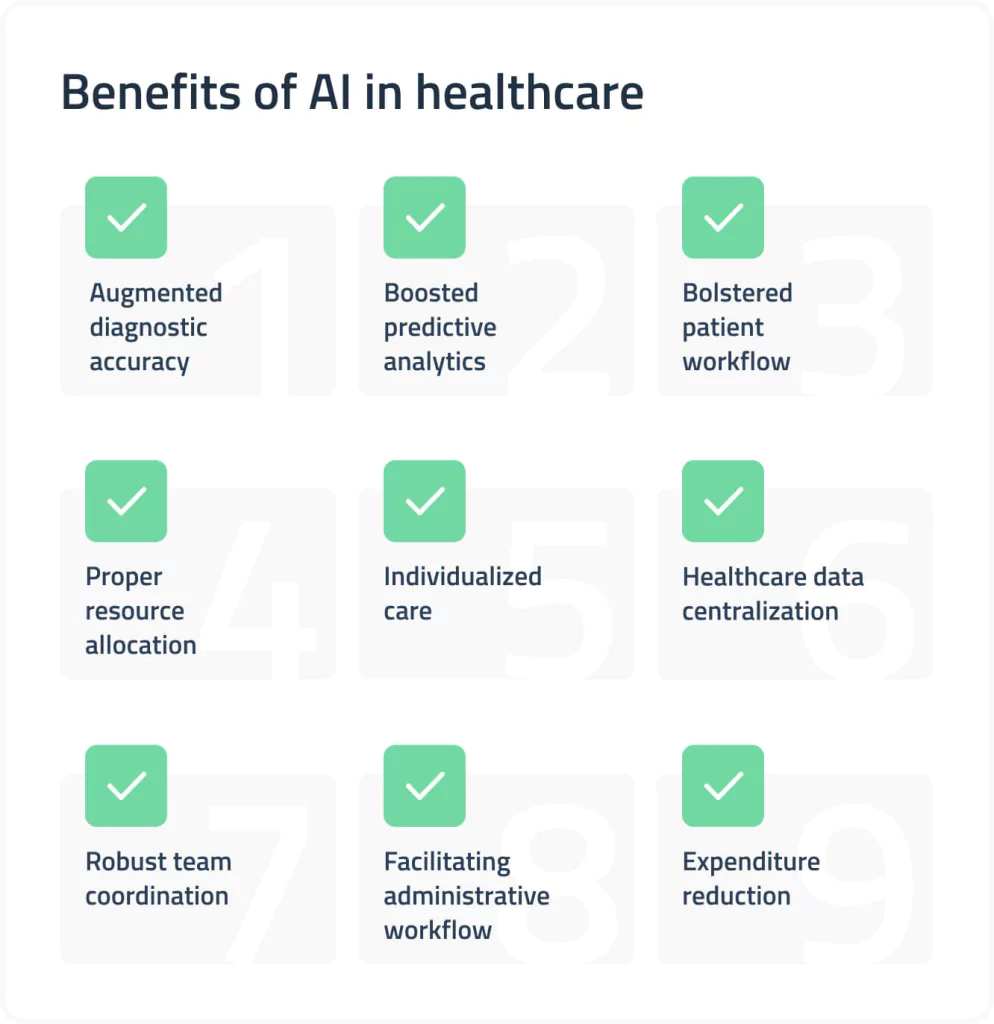
- Augmented diagnostic accuracy. It is achieved via meticulous and error-free analysis of numerous medical records, images, and test results. Accessing such information on short notice, physicians can not only diagnose specific cases properly but also promote preventive disease detection.
- Boosted predictive analytics. AI-driven healthcare solutions identify patterns in a person’s medical history and current health indices to pinpoint potential risks and suggest proactive measures to mitigate them. Such an approach improves patient outcomes and reduces treatment costs.
- Bolstered patient workflow. AI utilization for various medical use cases leads to minimizing the period a person spends in the hospital, decreasing admission time, and promoting faster progress of the patient down the healthcare service delivery pipeline.
- Proper resource allocation. Armed with top-notch AI tools, hospital management can handle emergencies at every patient touchpoint, distribute doctor workload equally across working hours, and deal with sudden patient influxes in certain seasons, thus addressing the problem of personnel burnout.
- Individualized care. NLP solutions and image-based AI mechanisms enable prompt routing of patients to relevant specialists, swift decision-making, and shorter time-to-treatment. Besides, AI software allows doctors to obtain a 360-degree view of each patient through a comprehensive analysis of their genetics, lifestyle, and medical history. The chief deliverable of this process is a tailored approach to every specific instance and medical service consumer.
- Healthcare data centralization. With a robust AI-fueled solution in place, healthcare providers can forget about data silos and the necessity to process the aggregated records manually. When such systems are combined with cloud computing technologies, medical organizations get 24/7 access to secure data storage where data can be subjected to efficient analytics and turned into actionable insights.
- Robust team coordination. When all healthcare personnel are kept on the same page and can exchange patient data in real-time, all cogs within a complex hospital machine work in harmony, effectively collaborating towards a common goal – disease cure and prevention.
- Facilitating administrative workflow. Scheduling appointments, processing billing, managing medical records, and the like are tedious but indispensable elements of the hospital routine. AI can streamline and automate many of these tasks, lessening administrative burdens, eliminating errors, and freeing healthcare experts to attend to their patient-facing responsibilities.
- Expenditure reduction. When repetitive and redundant tasks are delegated to machines, hospitals can save on human workforce OPEX and redirect the accumulated finance to promote medical research or improve patient care.
To enjoy these benefits to the fullest extent, healthcare organizations should be watchful of the pitfalls that await them on the way of harnessing AI-powered software.
Challenges of using artificial intelligence in healthcare
DICEUS has successfully completed dozens of AI projects for various verticals, so we are well aware of the issues healthcare providers face when they embrace this technology.
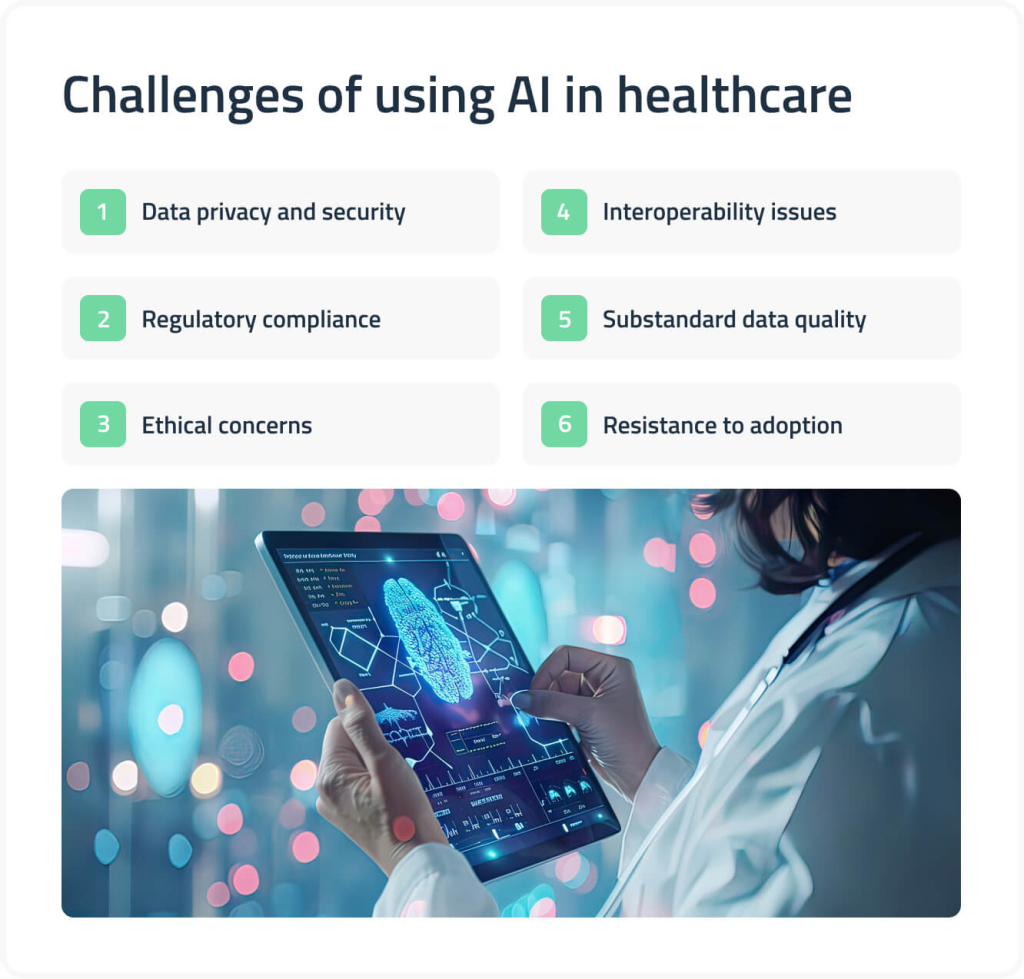
Data privacy and security
AI collects enormous amounts of healthcare data, most of which is sensitive and prone to becoming a target of penetration attempts. Medical organizations that onboard AI solutions should make data security and privacy their priority. It can be achieved by introducing reliable encryption mechanisms, performing regular audits, exercising stringent access control, and providing security-focused employee training.
Regulatory compliance
Personal data inviolability is a chief concern not only for medical institutions but for national and international regulatory bodies as well. The latter have issued multiple legal norms (such as HIPAA, GDPR, CCPA, and others) that healthcare companies must comply with. Unless they want to incur major penalties, medical service providers should take care their AI-powered systems keep abreast of changes in these regulations and invest in security measures to mitigate non-compliance risks.
Ethical concerns
Wherever AI is employed, its developers and owners should pay attention to its ethical use. It means guaranteeing the protection of data AI algorithms utilize for training, avoiding bias and unfairness across training datasets, ensuring AI algorithms’ accountability, and providing transparency in their operation. Organizations should perform regular ethics audits, educate healthcare personnel about the limitations of leveraging AI, and foster a culture of inclusivity and diversity across the company.
Interoperability issues
AI requires smooth data sharing among various systems and platforms, which is often a problem for legacy software and hardware that many medical facilities rely on for their shop floor activities. To ensure the free flow of data that maintains its integrity and privacy, hospitals should provide seamless integration of all elements of their digital ecosystem and introduce standardization of data formats and protocols.
Substandard data quality
AI mechanisms critically depend on the quality of input data they use for training and analysis to generate accurate and relevant results. That is why before any data is fed into AI solutions, it should be cleaned and pre-processed to ensure its completeness, accuracy, consistency, conformity, integrity, understandability, and relevance.
Resistance to adoption
Often, innovations are met with hesitation or even downright opposition by employees who are used to good all practices and tools and are worried about their job security or lack of technical expertise. To ensure successful onboarding of AI-fueled solutions, key decision-makers should act as principal transformation drivers by creating a universal buy-in across the organization, implementing comprehensive training programs for the personnel, and fostering an atmosphere of continuous improvement and openness to change.
Evidently, the process of AI development and onboarding is a hard nut to crack and can’t be handled by healthcare providers without a competent and reliable IT vendor. Due to the high qualifications of its experts and profound experience in AI development for the medical industry, DICEUS is a perfect candidate for this role. Contact us to discuss the details of your future AI project that will elevate the efficiency of your healthcare organization to a new level.
Experiencing a lack of technical expertise and skills?
Connect with a professional team to address your project challenges.
To sum it up
Artificial intelligence and related technologies (rule-based expert systems, machine learning, and natural language processing) are widely embraced by healthcare providers who leverage them in multiple use cases, including patent experience, robotic surgery, medical diagnosis, drug discovery, medical records management, and more. When used sensibly, AI-driven tools can improve diagnostic accuracy, boost predictive analytics, individualize care and step up patient workflow, optimize resource allocation, promote team coordination, reduce OPEX, etc.
By addressing major AI onboarding challenges and hiring high-profile IT experts to develop and implement such solutions, healthcare organizations can derive maximum value from AI software and hone their competitive edge.
Frequently asked questions
What is the role of AI in the healthcare industry?
Artificial intelligence can revolutionize pipeline routines across multiple verticals, and the software sector is no exception. By making AI-driven software part of their digital infrastructure, healthcare providers can radically streamline and facilitate their efforts in diagnosing, monitoring, and treating patients.
How is AI used in healthcare?
AI-fueled solutions excel at boosting many aspects of healthcare workflow, including patient experience, medical diagnosis, drug discovery, medical records management, robotic surgery, and more. If properly implemented, such digital products will give a strong competitive edge to medical organizations that harness them.
Which AI technologies are commonly used in healthcare?
The simplest AI mechanisms rely on rule-based expert systems. For more sophisticated use cases, machine learning, deep learning, and natural language processing are employed. They enable the software they are integrated with to become more powerful and improve its efficiency in the process of functioning.
What benefits does AI bring to healthcare?
Healthcare providers that implement AI-powered software report augmented diagnostic accuracy, improved patient workflow, efficient resource allocation, boosted predictive analytics, robust team coordination and collaboration, upgraded administrative pipeline, significant expense reduction, and increased patient satisfaction.
What challenges and limitations exist for AI in healthcare?
Poised for integrating AI in their digital ecosystem, healthcare organizations must be ready to deal with such issues as data privacy and security, regulatory compliance, ethical concerns of using AI, interoperability problems, inadequate data quality, resistance to change among stakeholders, and significant implementation costs.
